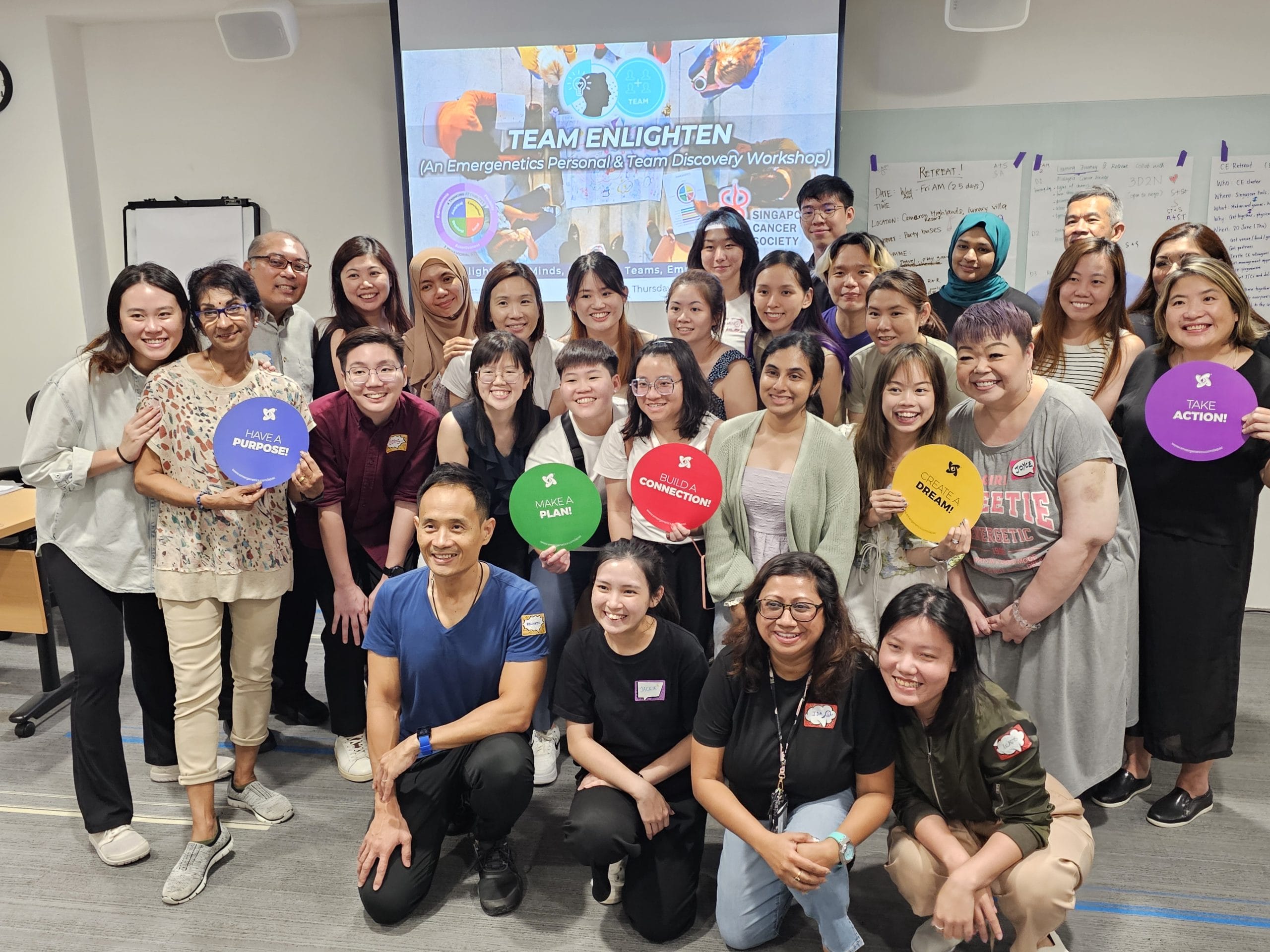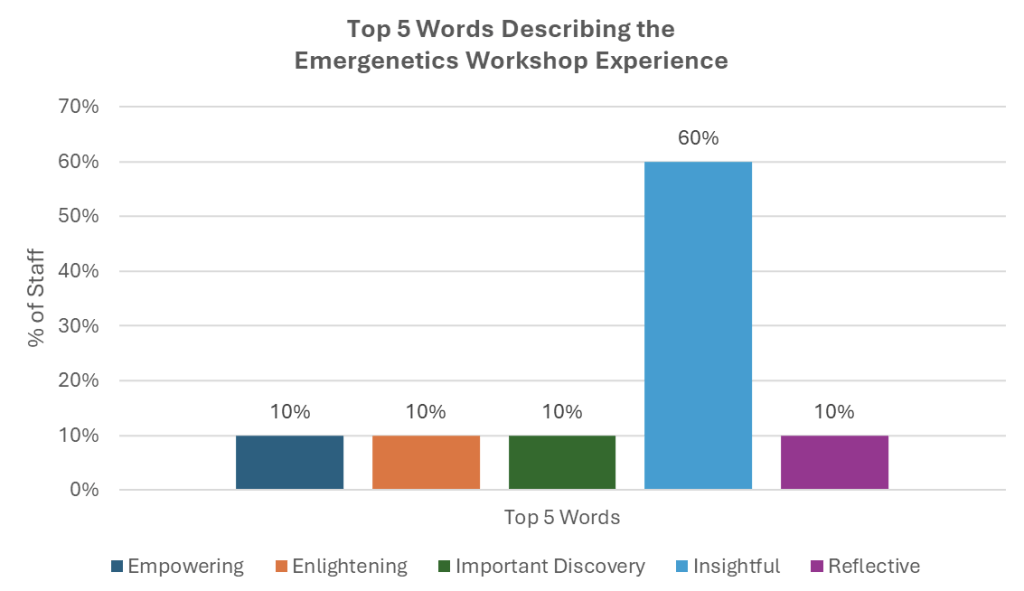
I recently connected with Ida Cecil, Head of Corporate Affairs of the Singapore Cancer Society, to get her take on a recent Emergenetics programme. In partnership with Terence Tan, Director of Trost Learning, we hosted a Meeting of the Minds for the nonprofit’s employees and were eager to hear about the impact of the workshop.
Jenn Denfield (JD): Ida, how did the Singapore Cancer Society come to learn about Emergenetics?
Ida Cecil (IC): It started through our Chief Operating Officer, Geraldyn Lim, who knew Emergenetics’ Regional Director, Colin Yeow. Over coffee one day, they discussed the possibility of bringing Emergenetics to our organisation.
At the Singapore Cancer Society, we have team members from different work environments, including corporate affairs, community health, partnerships and sponsorships. It’s a very broad range of people.
On top of that, with Singapore being a multicultural country, we all come from diverse backgrounds. We are very dynamic in that sense, and we bring together many different perspectives.
Emergenetics was a natural opportunity for us to find out a little more about each other, ourselves and how we work. We knew it would help us explore our working styles and what our strengths and weaknesses were, so we could better use those differences.
JD: Was there anything specifically that drove the timing for the partnership?
IC: This is the 60th anniversary of the Singapore Cancer Society, and we are celebrating it externally and internally. What could be a better way to do that than to give back to our own people who work so hard?
We also have a few big projects coming up with the 60th anniversary, so it’s a busier year for us. When we work so fast, we can sometimes forget to pause and check in on where we are at. It was important to have different points in the year to regroup, reflect and understand each other better. The Meeting of the Minds helped us do just that.
JD: What opportunities do you feel Emergenetics will help you and your team address?
IC: As I mentioned, we have a lot of new projects this year. We’re opening up a new rehab centre and working with external stakeholders. Internally, we have a number of big events.
Because the pace is quicker than in most years, Emergenetics is at the back of our minds, so that when we’re working, we’re aware of our styles, including our team’s and our own. We’re also aware of the broader team as a whole and where our strengths lie.
As Head of Corporate Affairs, when I’m assigning work, Emergenetics gives me a better idea of what sort of task would be more engaging for different team members. I have our team’s Dot Graph up on my wall. I am always looking at that!
JD: What did you enjoy most about the learning experience?
IC: Finding out more about each other. My team, for example, has very strong Conceptual energy. We also found that teammates had strong interests elsewhere. The most enjoyable part was learning about one another. While we were in the workshop, we were working cross-functionally, and I had my teammates running over and saying, “Oh, Ida, this is you!”
The bonding really helped as well. It brings us back to base and reminds us why we started working at the Singapore Cancer Society in the first place. All of us have had the experience of losing a loved one to cancer or having a loved one on their cancer journey. When we are so bogged down in the work, sometimes we forget the purpose of what we are doing. This workshop was a great opportunity to bring us back to base, reassess why we are here and renew our spirit.
JD: Did anything surprise you during the session?
IC: Yes, the accuracy of the Profile! I remember questions in the assessment were very detailed, and the results that came about were very, very accurate. Apart from the four Thinking quadrants, we had the Behavioural traits. That was really beneficial. It helped us understand how to communicate better with each other. The accuracy was what surprised me most, though. I didn’t expect it to be so precise.
JD: What did you find most valuable about the workshop?
IC: The workshop was run wonderfully. It allowed us to really evaluate each other in a more open and welcoming manner. We didn’t feel at all restricted when we were talking about the traits. We were kind of celebrating our different strengths and weaknesses.
Teammates were saying, “I’m not as strong here, but that’s where you come in.” We appreciated each other’s gifts and how they could fill our gaps.
JD: What was one “aha” moment or takeaway that you gleaned?
IC: The realisation that we all bring different things to the table came out very strongly. Even though we may have understood that before, it’s a very intangible concept. Emergenetics provided that visibility. We all found we really do bring different things to our teams, and we can see it through the assessment. It gave that belief more tangibility.
JD: How do you anticipate applying what you discovered in your day-to-day work?
IC: I’m very fortunate to have a very dynamic team. During meetings, we are mindful of each other’s strengths and preferences. We bring it up in conversation. I see more empathy towards each other and more awareness. I’m realising that each team member is making the effort to tailor our connections. It’s more deliberate now, and I’m seeing the impact.
JD: If there was one word or phrase you would use to describe your experience, what would it be?
IC: Emergenetics is an extremely insightful tool for you and your team, and it’s amazingly accurate!

JD: Is there anything else you’d like to share about your experience?
IC: Emergenetics is a tool that many companies should utilise. You will be quite astounded by the results that come forth and the bonds that it allows you to build. When we bring our guard down, we can achieve so much more. I would encourage more companies to use it. I’ve seen benefits in a matter of weeks.
Curious what Emergenetics could help your team achieve? Explore our solutions or fill out the form below to speak with one of our team members today!
 Print This Post
Print This Post
